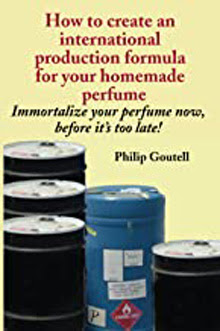Regardless of your approach to perfumery you are probably quite aware of alcohol but when it comes to buying, using, or selecting alcohol or an alcohol substitute for your perfume you might feel a bit lost. You're not alone.
The first time I had a perfume made for me – this was before I began formulating my own oils – the vendor supplied it ready to bottle. The alcohol had already been added. There were no questions about alcohol for me to answer. The next perfume oil I had made for our company was simply purchased by the pound, without alcohol. I had to find a filling house to add the alcohol. Here my education began. I was what alcohol I wanted and I didn't have a clue. They helped me.
If you are interested in how commercial perfumes are made you will quickly or not so quickly discover that most commercial fragrances made in the U.S. use alcohol tagged "SD" or "SDA" indicating that the alcohol has been "specially denatured" and therefore not subject to the tax collected on the alcohol content of alcoholic drinks. Thus the big issue is not the quality of the alcohol or its scent or lack of scent but the rate at which it is taxed.
The U.S. allows alcohol to be denatured according to a number of formulas. Today alcohol denatured by formula SDA 40B is a common choice for perfumery.
SDA 40B is pure ethanol with a very small amount of a denaturant added, one which has minimal effect on its odor. In the U.S. you can purchase up to 5 gallons of denatured alcohol a year without a permit. If you require more you can either apply for a permit or take your project to a filling house with a permit that can supply you with all the alcohol you need.
If you are a beginner in selecting alcohol, SDA 40B is the favored choice. You'll find sources here. As you become more experienced you may want to try alternatives but if you never use anything but SDA 40B ethanol you won't go wrong.
Water
The other question asked when purchasing alcohol is the "proof" you desire. 200 proof is pure ethanol. 190 proof alcohol is 95 percent ethanol and 5 percent water. 170 proof alcohol is 85 percent ethanol and 15 percent water. The use of 200 proof alcohol is rare. Having some amount of water in the alcohol is believed to make the fragrance better. There is no complete agreement as to WHY water makes the perfume better. A number of theories are presented but there is no definite answer (in spite of what you may read!) Do your own experiments and go by your own results.
Availability
Today "perfumers alcohol" is more available than it was ten years ago. Not only are there, in the U.S. and U.K., a number of sources that will ship small quantities, also available varieties beyond SDA 40B. This means that the "hobbiest" – or small, independent perfumer – need not look to vodka, Everclear or one of the non-alcoholic solvents in order to make perfume.
How Alcohol Is Made
Typically the alcohol used in perfumery is distilled from a grain such as corn. Alcohol can be distilled from a variety of other plants such as grapes or potatoes. While, chemically speaking, ethanol is ethanol, it is said that a sensitive nose can, by smell, distinguish the source of any particular alcohol. If you are interested in the fine points of alcohol used for perfumery, you might read this article from Culinary Solvent (The Northern Maine Distilling Company), one of the current sources of perfumers alcohol.


No comments:
Post a Comment